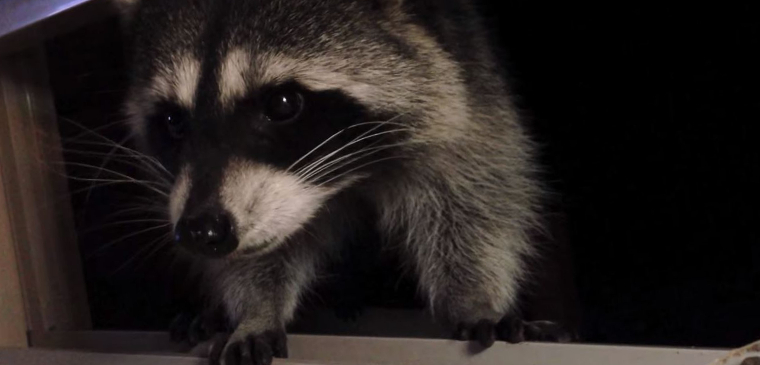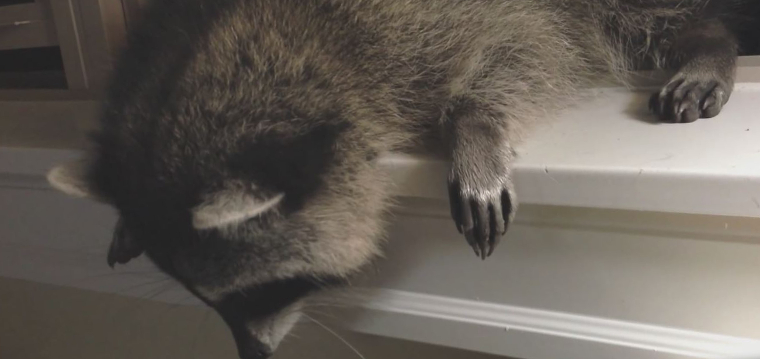-
info@aaanimalcontrol.com
Call us for help in your town
Humane Wildlife Education
Raccoon Eviction Fluid: The ONLY Raccoon Repellent That Works
Raccoon Eviction Fluid: The ONLY Raccoon Repellent That Works
Need raccoon removal in your hometown? We service over 500 USA locations! Click here to hire us in your town and check prices- updated for year 2020.
If you were to ask any homeowner why they called in wildlife rehabilitators to come in and remove a rogue raccoon, we would like to bet money on the fact that many of them would say, “Because we failed with everything else that we tried.”

In a few cases, the raccoon is easily driven out of a residential property. In others; however, the situation is very different. The raccoon has found a place that it can call home for a while, with a steady source of food and fresh water nearby. There is good news on the horizon though; many raccoons will only spend a brief period of time in any one den site before moving on to another one. This is more so the case with females. The male raccoons don't usually venture too close to humans unless it is winter and it's having a hard time on the outside.
Raccoon eviction fluid, also known as just eviction fluid or wildlife eviction fluid, is something that usually works better on female raccoons. The eviction fluid itself is made up of a bunch of different things, none of which are particularly pleasant, but all of which make a female raccoon believe that male raccoons are close by. It's not just the fluids from male raccoons that are used either; secretions from various male animals are used, all designed to make the female believe that predators are close.
When the female raccoon is also a mother, the smell of male predators, or just predators in general, is going to be enough to scare her. She will believe that her new family is no longer safe, and that will be enough to encourage her to move her kits from the current unsafe den site, to a new one somewhere else.
Although using raccoon repellent won't solve all of your problems, the fluid can go some way to driving the raccoon out, and not just the one raccoon — all of them. The mother will carry her kits, one by one if necessary, to another place. That leaves you free to seal up whatever holes allowed her entry in the first place, repair any damage she may have caused, and cleanup the mess that she has left behind. Oh, and remove all attractants for a future raccoon-free residence.
There are a number of so-called raccoon repellents on the market, some of which can even be really expensive. There are a few people who swear by these methods, of course; things like ultrasonic sound devices, lights that come on and go off when a sensor is triggered, and various granule or liquid-based items. These can have some success, but usually offer little to no protection. Liquid and granule-based formulas will need to be reapplied regularly, and over a long period of time, these “cheap" options are no longer cheap. In fact, with prolonged use you will actually find that repellents are a more expensive option than calling in the professionals — wildlife rehabilitators.
The ONLY Raccoon Repellent That Works
Need raccoon removal in your hometown? We service over 500 USA locations! Click here to hire us in your town and check prices- updated for year 2020.
Repellents are common in the pest control world; items that are designed to move the creature along without any human intervention … Except for putting the repellent there in the first place, of course. Sadly, almost all repellents fail against an animal that is as strong, smart, and determined as the raccoon; although, there is one that might just work for you.

Raccoon Eviction Fluid
Did you know that a raccoon has the potential to travel in excess of twenty miles in order to find old and new den sites, good sources of food, and a place to raise a new and young family? That means that captured raccoons would need to be driven as far as 25-30 miles away or more from the point at which they were trapped, before they could then be released. If you don't drive far enough away, the raccoon can come back. They regularly return to old den sites, and it won't be long until they've travelled the distance to find their way back to yours.
Aside from that, trapping raccoons is actually a very difficult process, coming with a string of legalities and regulations that you will need to look into beforehand. The more you try to intervene, the more legalities you will be faced with, and that's before you look into the whole idea that raccoons are one of the most prolific rabies-carriers in the United States.
Clearly, not an animal that you would want to get too close to.
Excluding raccoons is a great way of moving them along, without having to get too involved. Repellents and deterrents can help to make this process easier, but you will find that many “age-old” repellents don't work half as well in this day and age, and the majority of the products that you can buy online have no effectiveness whatsoever.
We know this, because frustrated homeowners call us on a regular basis, requesting that we remove the raccoons they have failed to evict themselves.
No repellent is going to work effectively to drive a raccoon twenty miles away, and if they are still in the neighborhood when you turn off that high-pitch sound device, stop using those lights, or fail to apply the granule and liquid-based repellents, they'll just be back. You must also remember that raccoons will share the news of their den sites with other raccoons, especially females to females, and to their daughters and sons, like an old wives' club.
That's where wildlife eviction fluid comes in, also known as raccoon eviction fluid. Rather than repelling the animal using a bad taste or smell, or an annoying noise, raccoon eviction fluid is designed to “scare” the animal away by making it believe there are predators close by.
A female raccoon won't leave her babies in a nest if she thinks that predators are near. She will move them to another nest or den site — one that doesn't have a dangerous predator hanging around. Predators of the raccoon, especially females and their kits, include male raccoons, coyotes, foxes and wolves, and the body secretions of these animals are what go into making raccoon eviction fluid, and you can buy it online for around $15-20 for a 1oz bottle. You can then either spray the fluid around, saturated rags, tennis balls, or other things in it, shoving the item into a hole that you know raccoons frequent. You may need to place items soaked in this fluid all around the home — wherever you think the animals are or have been.
Of course, the bad side of using raccoon eviction fluid inside your home is that it smells pretty bad. If you have the fluid in the vents, ducts, or pipes, it won't be long before the smell makes it away around your home, from room to room.
Available in paste or gel form, in some places, raccoon eviction fluid can have some effect on removing a female raccoon from a building. You should check that you do have a female with kits before you start using it, though. If a male raccoon is hanging out in your attic, the smell of another male raccoon will rile it up, causing it to be aggressive and think that there is another of its species encroaching on its territory.
For more information, you may want to click on one of these guides that I wrote:
How much does raccoon removal cost? - get the lowdown on prices.
How to get rid of raccoons - my main raccoon removal info guide.
Example raccoon trapping photographs - get do-it-yourself ideas.
Raccoon job blog - learn from great examples of raccoon jobs I've done.
Raccoons in the attic - what to do to solve the problem.


















